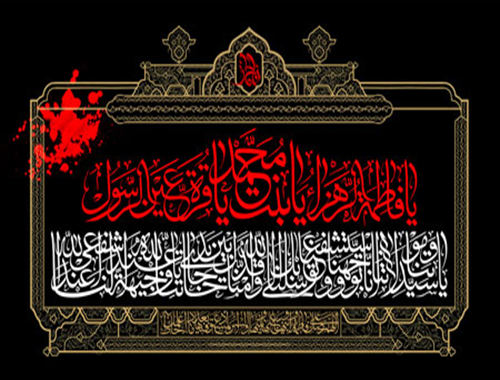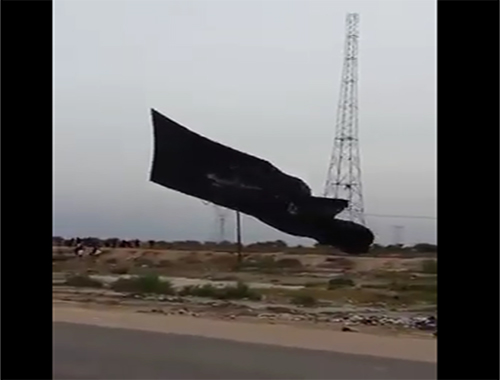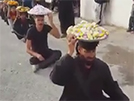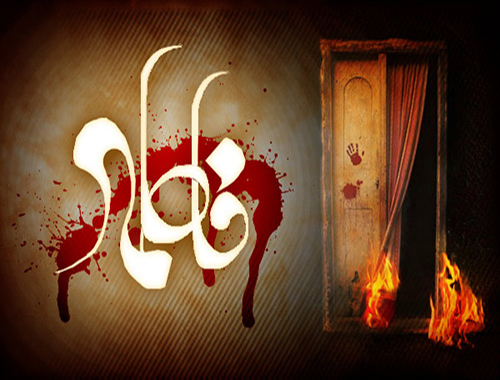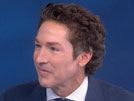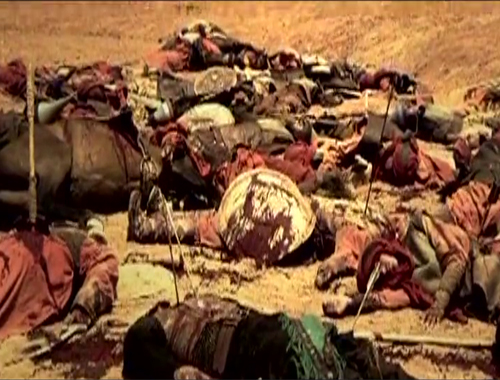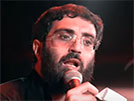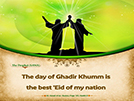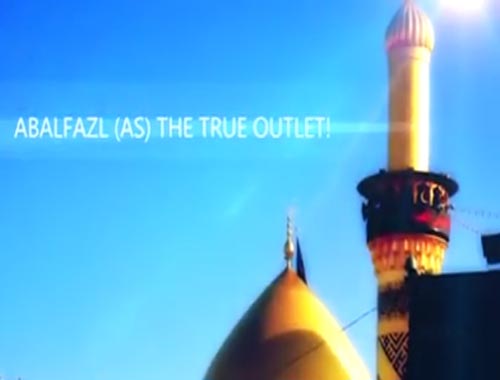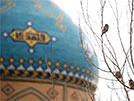Verses 15-19
- Details
- Hits: 2537
Sura 'Alaq
(The Clot)
No. 96 (verses 15-19)
(15) كَلَّا لَئِن لَّمْ يَنتَهِ لَنَسْفَعًا بِالنَّاصِيَةِ
(16)نَاصِيَةٍ كَاذِبَةٍ خَاطِئَةٍ
(17)فَلْيَدْعُ نَادِيَه
(18)سَنَدْعُ الزَّبَانِيَةَ
(19)كَلَّا لَا تُطِعْهُ وَاسْجُدْ وَاقْتَرِبْ
15. "Nay! If he desist not, We will certainly seize him by the forelock,"
16. A lying, sinful forelock!
17. Then, let him call (for help) to his council (of comrades),
18. We will call on the angels of punishment (to deal with him)!
19. Nay! Heed him not; but prostrate yourself and draw nigh (to Allah).
Commentary:
Prostrate Yurself and Draw Nigh (to Allah)!
The description of the previous verses is about the disbelieving rebels and their disgraceful treatment towards the holy Prophet (p.b.u.h.) and those who pray. Now, in the following verses, these rebels are warned most violently. It says that it is not so as Abu-Jahl imagins. (He thinks that he can tread on the neck of the Prophet (p.b.u.h.) when he is prostrating himself and restrain him from doing this divine action):
Nay! If he desist not, We will certainly seize him by the forelock.
* * * *
A lying, sinful forelock!
The term/la nasfa'an/ is based on /saf'/ which carries different meanings such as: 'laying hold upon, or seizing; to drag; to slap a man or his face with one's hand; to blacken the face; to make a mark upon something', and 'to abase'; (1) the best choice being the first meaning, here, though there are also some other possibilities in the current verse. Therefore, the phrase /la nasfa'an bin-nasiyah/ means: 'We will assuredly take him by the forelock to the fire (of Hell) ; or 'We will assuredly lay hold upon his forelock and drag him thereby with violence to the fire' ; or 'We will assuredly blacken his face', the /nasiyah/ 'forelock' being used for the face because it is the fore part, or 'We will assuredly mark him with the mark of the people of the fire, making his face black, and his eyes blue'; or 'We will assuredly abase him or render him despicable'.
In any event, the objective meaning that Abu-Jahl, or the likes of him, will be seized by his forelock and dragged on to the blazing fire, is that this happening occurs in the Hereafter or in this world or in both of them. Its witness is the narration cited in Tafsir-i-Fakhr-i-Rzai (vol. 32,p. 23).
The term /nasiyah/ means 'forelock', and 'its seizing' is said for the case when a person is to be taken to something with humiliation, because when the forelock of a person is seized he can do nothing but submit to the circumstances.
The word /nasiyah/, of course, is used for both men and precious things. It is used in some other senses, too.
The words A lying, sinful forelock refer to a person with a forelock who was both a lier and sinful like Abu-Jahl.
* * * *
A narration from Ibn-Abbas denotes that once when the Messenger of Allah (p.b.u.h.) was praying around 'the standing place of Abraham (at Mecca)' , AbU-Jahl went to him and told him that he had prohibited him from praying. The Holy Prophet loudly called at him and sent him away.
Abu-Jahl said: Do you call at me and send me away? Don't you know that the men in my tribe are more numerous of all others in these surroundings?. At this time the next verse was revealed, saying: Then, let him call (for help) to his council (of comrades),
* * * *
We will call on the angels of punishment (to deal with him)!
It is then that the punishment ofAllah, encompasses him when this neglectful, arrogant Man will understand he can do nothing.
The term /nadi/ is derived from /nida/ with the sense of 'call' which means 'common meeting', and sometimes it is used for an activity center, since, therein, the members usually 'call' each other.
Some have said that it is based on the root /nida/ with the sense of 'graciousness', because they entertain each other there.
But, the purpose of using /nadi/, here , is to refer to the people who gather in that meeting, or, in other words, the people and comrades which persons like Abu-Jahl rely on for their power in their affairs. The term /zabaniyah/ is the plural form of /zibniyah/ which originally means 'disciplinary guards', and, here, it appears to refer to 'the Angels who keep guard over Hell'.
* * * *
In the last verse, of this Sura, (that is; the verse of compulsory prostration), it emphasizes that it is not as he imagins and persists on not bowing in adoration, it says:
Nay! Heed him not, but prostrate yourself and draw nigh (to Allah)..
Those, such as Abu-Jahl, are naught to be able to stop 'you' from prostration, or to be a hinderance on the path of progress for 'your' religion. 'You' do cover the way by prostration and adoration to draw yourself closer to Allah.
By the way, it is understood from this verse that prostration causes Man to be close to Allah so a tradition from the Messenger of Allah says: The time when a servant of Allah is clos!est to Him is the time when he prostrates himself.
We know of course, that, according to the narrations of Ahlul-Bait, there are four obligatory prostrations in the verses of Qur'an. The Suras containing them are: Sujdah, Fussila, al-Najm, and, here, 'Alaq. the rest are only recommended prostrations.
* * * *
Explanation:
Rebellion and Self-Sufficiency.
Most corruptions and vices raise their ugly heads amongst rich and oppressive people who have always been at the head of the line against prophets. These poeple are the same ones who are mentioned in the Qur'an under the names of: /malaa/ 'the leaders', (7:60); or /mutrafin/ 'wealthy ones', (34:34); and sometimes /mustakbirin/ 'oppressors', (23:67). The first refers to the rich whose outside appearances look valuable but, their real insides are empty; the second means the ones who enjoy the good things of this life and live in comfort and are completely proud, self-sufficing, and unaware of others' pain; and the third is applied to those who, talking nonsense about the Qur'an, insolently transgress the bounds of Allah and the rights of His servants.
The origin of them all is the imagination of being self-sufficient, the characteristic of those of low capacity who, when they obtain some blessings, wealth, tranquility or high position, feel self-sufficient and forget their Lord, quite neglectfully.
But, we know that the wealth of a person may disappear easily in a few minutes, or be wholly destroyed by a flood, an earthquake or lightning. One's health, too, is in danger by such a slight thing as drinking water.
What kind of negligence is it that dwells in some people to the point that they think they are self-sufficient, and transgress on others, proudly, in the society?
In order to remove this vice from himself, Man should think of his own weaknesses, on the one hand, and on the other hand, he should contemplate on the Great Power of Allah, and study the history of the destruction of arrogant people, of anicent generations, who were much stronger and more powerful than him.
He must learn humility: This is his defence.
* * * *
Supplication:
O Lord! Protect us against pride and arrogance; the main vices which cause us to be far from You.
O Lord! Please do not leave us alone, even for a moment.
O Lord! Please bestow on us such an ability that we valiantly overcome the oppressors who hinder our path, and make their evil plans fruitless.
(1) Fakhr-i-Razi, vol. 32, p. 23
The End of Sura 'Alaq
(The Clot)

